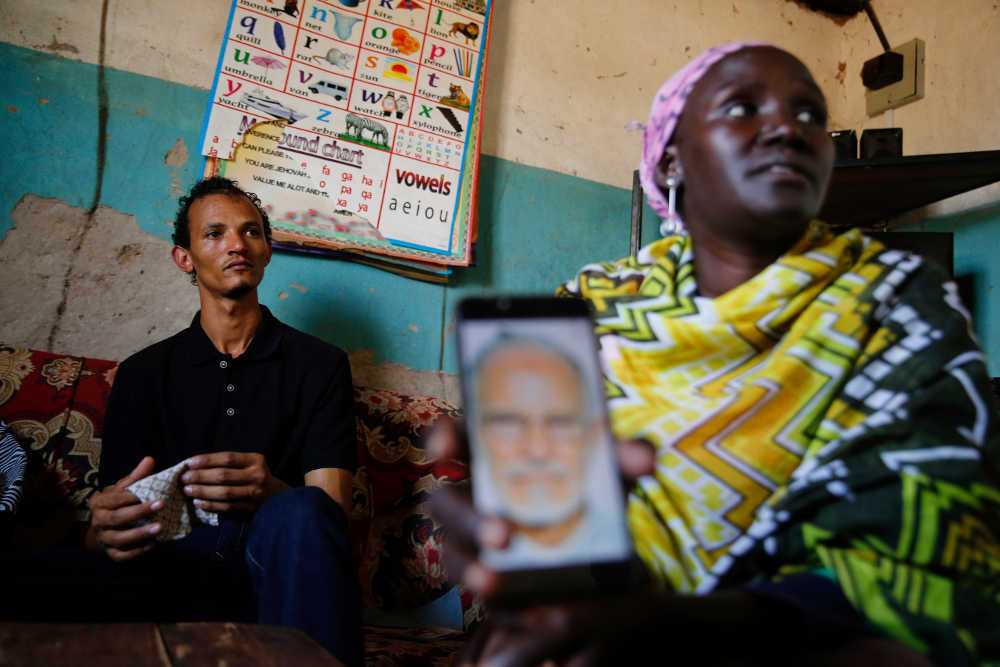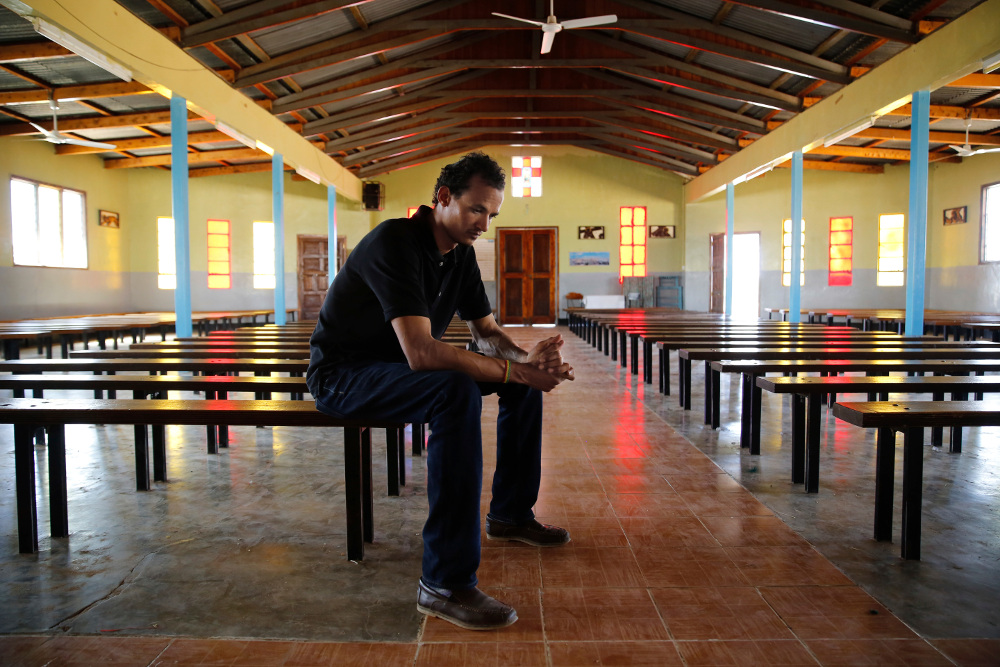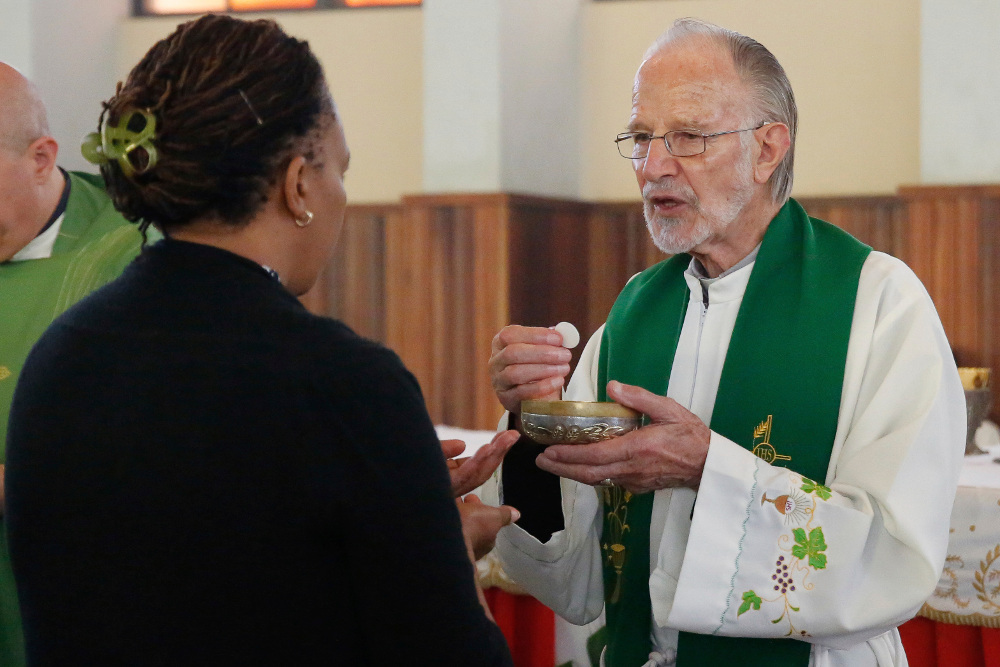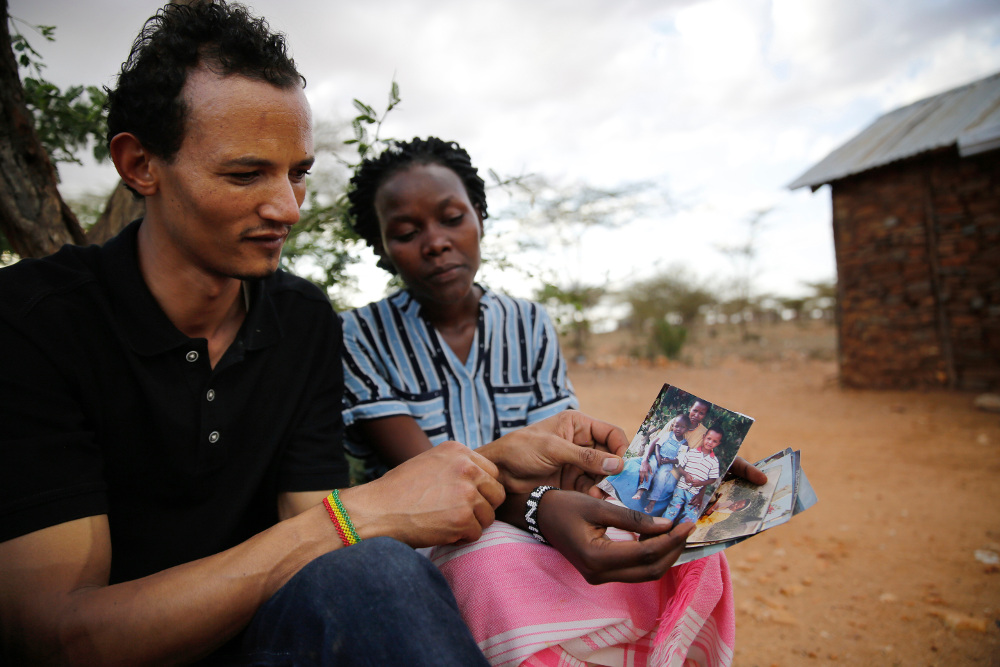
Gerald Erebon sits with his aunt, Scolastica Apayo, as she holds a phone displaying a photo of Fr. Mario Lacchin, during an interview at her home in the Isiolo area of the Archers Post settlement in Kenya on June 30. Scolastica said her sister, Sabina Losirkale, finally told her the secret in 2012, two weeks before she died. (AP/Brian Inganga)
When Sabina Losirkale went into labor, her sister Scolastica recalls, priests and religious sisters filled the delivery ward waiting to see the color of the baby's skin — and if their worst fears had come to pass.
Scolastica and dozens of villagers peered in from behind the clinic fence, as well.
A nun screamed. The boy was white — "a mzungu child," Scolastica said, using Kiswahili slang.
"How will we cover up this shame?" the sisters fretted, she recalled.
The shame that brought this baby into the world: An Italian missionary priest, her family alleges, impregnated this Kenyan girl when she was just 16. But the nuns need not have worried about the scandal spreading.
The priest — who to this day denies paternity — was transferred, and a Kenyan man was found for Sabina to marry. He would be listed as the father on the boy's birth certificate.
The church's efforts to conceal what is alleged to have happened here would stretch over three decades — a testament to the extraordinary ways in which church officials have dealt with accusations that priests in the developing world have had sex with girls and young women. Here, the Catholic Church's sexual abuse crisis is just beginning to force a reckoning.
The boy who was born to Sabina Losirkale on that day in 1989 has been an outcast of sorts for all of his life. Tall and light-skinned, with wavy hair, Gerald Erebon, now 30, looks nothing like the dark-skinned Kenyan man who he was told was his father, or like his black mother and siblings.
"According to my birth certificate, it is like I am living a wrong life, a lie," he said. "I just want to have my identity, my history."

Gerald Erebon sits for a portrait inside Mary Immaculate Catholic Church in the Isiolo area of the Archers Post settlement in Kenya on June 30. (AP/Brian Inganga)
A glaring issue
Amid the torrent of sex abuse accusations that have rocked the priesthood, little attention has been paid to the pregnancies resulting from those illicit acts. And nowhere is this a more glaring issue than in Africa.
While there are no official statistics, experts point to a "culture of silence and compromise" that has allowed abuses of all kinds to fester in African society, said Augusta Muthigani, in charge of education for the Kenyan bishops' conference.
"Matters of sexuality are not discussed openly," she said.
The continent has long lagged behind the United States, Europe and Australia in confronting the problem of priests having sex with children, given the church's priorities here have focused on fighting poverty, conflict and traffickers who sell children off to war or work.
Recently, East African bishops established regional child protection standards and guidelines to prevent child sexual abuse. And in parts of Francophone West Africa, the Catholic Church has launched safeguarding programs for society at large.
Those initiatives, though, are relatively new, scattershot and underfunded. And eight months after Pope Francis summoned bishops from around the world for a summit to insist that clergy sexual abuse prevention be a priority for the universal church going forward, African bishops made no mention of it in their final declaration after a continentwide assembly in July. All in a region where advocates say Catholic clergy routinely violate their vows of celibacy, including with children.
Fr. Mario Lacchin encountered Sabina Losirkale when she was a student at the Gir Gir Primary School in Archer's Post, a dusty town on the highway to Ethiopia. The school was established by the Consolata Missionaries religious order, which had come to Archer's Post to spread the faith to the semi-nomadic tribes of Kenya's northern Rift Valley.

Fr. Mario Lacchin presides over a Mass at the Restoration Centre Catholic Church, Nairobi, Kenya on June 30. (AP/Brian Inganga)
Growing up in the 1970s and '80s, the Losirkale girls and two cousins were often left on their own; their parents were poor shepherds and spent days away from home, seeking pasture in the bush for their animals.
Starting about a year before she turned 16, Sabina skipped afterschool sports to go to the priests' quarters to do housework, cooking and cleaning for the parish priests. Scolastica recalls she would sometimes see Sabina and Lacchin hugging as they said goodbye.
Other times, Scolastica said, Sabina would come home from Lacchin's house crying and asking for Scolastica to fetch water so she could bathe. Some nights she didn't come home at all.
At the time, the priest was in his early 50s.
"I think Father Mario was taking advantage of my sister," said the 45-year-old widow, looking through family photos in her one-bedroom, mud-brick home. "He bribed her with gifts, food, clothes. He was even buying us books. My sister used to come with books, pens, all we needed."
One night, Sabina vomited. It was the first indication that she was pregnant.
Their parents were shocked and angry. They demanded to know who the father was.
Lacchin was quietly transferred to a nearby mission; his driver and a catechist at Archer's Post, Benjamin Ekwam, was chosen to marry Sabina.
Nevertheless, people talked.
"You know, it was very shameful in the community," Scolastica said. "If someone wanted a child, a girl, they just married. So this was just an embarrassment to the whole community."
Sabina was just 16 when she gave birth March 12, 1989. She had conceived a few weeks after her 16th birthday. In Kenya, the legal age of consent was and is 18.
Advertisement
A thorn in the Vatican's side
The Vatican doesn't publish statistics about the number of priests who have fathered children. The Holy See only publicly admitted that it's a problem this year, and only then because it was compelled to acknowledge that it had crafted internal guidelines to deal with it.
The man behind the disclosure was Vincent Doyle, an Irish psychotherapist and son of a priest who in 2014 launched an online resource, Coping International, to help children of priests.
Doyle has been a thorn in the side of the Vatican ever since, seeking to raise awareness through the media about the plight of these children, who often suffer emotionally and psychologically. He has also begun advocating for their mothers, some of whom were just girls when they conceived.
In recent months, he has forwarded three such cases to the Vatican: those of Erebon and of children born of a 17-year-old in Cameroon and a 15-year-old in the United Kingdom.
All told, Doyle believes priests' children number in the thousands, given the 415,000 Catholic clergy alive today and church teaching that forbids artificial contraception and abortion. Doyle estimates that about 5% of these births are the result of sex between a priest and a minor, though he has only anecdotal evidence.
"I think Father Mario was taking advantage of my sister. He bribed her with gifts, food, clothes. He was even buying us books. My sister used to come with books, pens, all we needed."
— Scholastica Apayo
Fr. Stephane Joulain, a leading expert in clergy sex abuse prevention in Africa, said the majority of cases of sexual abuse of minors in Africa involve foreign missionary priests. But he said there is a significant problem of local African priests fathering children, including to young mothers, because of cultural norms: "You become a man only when you have fathered children."
Many priests cite this pressure from family or tribe to explain why they have had offspring. Other priests, Joulain said, rationalize their behavior by saying celibacy is an imported "Western" tradition that has no place in Africa, where girls are often considered adult once they reach puberty, irrespective of the law.
The flouting of celibacy vows among African clergy is no secret to the Vatican. Nearly every time a group of African bishops visited the Vatican during the papacy of Pope Benedict XVI, he would remind them of the need to train their priests to "embrace the gift of celibacy," a reminder not often given to other bishops' conferences, according to a review of his speeches to more than a dozen African bishops' conferences.
Decades ago, as in Erebon's case, it was common for bishops and religious superiors to relocate an offending priest and try to find a man who would accept the woman and child as his own, Joulain said. If the mother was lucky, the order would provide financially for them.
"Congregations were all dealing the same way with the same problem," he said.

Gerald Erebon and his sister, Lina Ben, hold photos of them and their mother, Sabina Losirkale, who passed away in 2012 after a long illness and depression, in the Isiolo area of the Archers Post settlement in Kenya on June 30. (AP/Brian Inganga)
Growing up different
Gerald Erebon grew up devoted to the Consolata Missionaries who employed his mother and her husband and, along with an Italian order of nuns in Archer's Post, paid for his education. An altar boy, he entered the minor seminary after graduating from Gir Gir Primary School, hoping to join the order as a priest.
He knew well he was different from his dark-skinned siblings and the rest of the Samburu and Turkana people of the region. His half-sister Lina Ben, 27, recalled her siblings teased Erebon mercilessly, as did the family of the man he knew as his father. They called him "bastard." Even Erebon's last name was different, belonging to his maternal grandfather.
When Lina was 14, she asked her mother why Gerald didn't look like her other children, and why his friends often referred to him as "mtoto was padre" — "child of the priest."
Her mother initially pushed her away, but eventually told her that "Dad to Gerald is a priest called Father Mario and he is not here."
Scolastica said her sister finally told her the secret in 2012, two weeks before she died.
"Now that my days are over," her sister told her, she could reveal all: "When Gerald will ask you who's his father, just tell him: Father Mario."
In fact, neighbors took Erebon's heritage for granted. "The people of Archer's knew it was Father Mario. The people knew that the priest was responsible. Because even the boy — he resembled the priest when he was born," said Alfred-Edukan Loote, who taught Erebon in primary school.
Young Erebon often got into fights, raging at the children who teased him. He eventually was expelled from the minor seminary after he smashed a plate of hot food on the head of a boy who had called him son of a white man.
After his mother's death, Erebon asked Scolastica the question he never had the courage to ask his mother. She remembers hearing him cry over the phone when she told him.
"The people of Archer's knew it was Father Mario. The people knew that the priest was responsible. Because even the boy — he resembled the priest when he was born."
— Alfred-Edukan Loote
'I just want to have my identity'
In mid-2013, Erebon reached out to Lacchin, sending him a series of emails over the span of two months, hoping to establish a relationship following his mother's death. By now, the two men looked strikingly alike, tall and lanky with sharp cheekbones.
"Ever since I knew you as my real biological father, I could not stop asking myself questions as to why I was born the way I was born, which consequently had put hate in me against you," Erebon wrote.
But he said he had since had a change of heart and now forgave him. "I love you father," he wrote. "Let us not allow the past to affect our present and future." He signed the email "Your son, Gerardo" — the Italian name that appears on his birth certificate.
After Erebon received no response, he said he tried to meet Lacchin in person in Marsabit, where Lacchin was working as a church administrator. Erebon said Lacchin brushed off his overture. Told by the priest to take his complaint to the bishop, he did not.
Five years later, Erebon — by then a student studying education at Catholic University of Eastern Africa, his tuition partially paid for by an anonymous donor — reached out to Doyle, the Irish psychotherapist.
Doyle immediately contacted the Rome-based superior of the Consolata Missionaries, Fr. Stefano Camerlengo, who sent a top official to investigate. The order arranged three meetings over the past year between Erebon and Lacchin in Nairobi, in what Camerlengo told Doyle was an effort at facilitating dialogue between the two.
According to minutes of a Jan. 15 meeting prepared by a Consolata priest who attended, Lacchin denied paternity. He refused to take a DNA test "since it would mean that he is possibly the father, whereas he knows that he is not the father."

Gerald Erebon sits with students at his old primary school where he said kids used to be tease him about him being the priest's son, in the Isiolo area of the Archers Post settlement in Kenya on June 30. (AP/Brian Inganga)
Fr. James Lengarin, the Consolata's deputy superior who investigated the case and hails from a town not far from Archer's Post, said the order felt it could not compel Lacchin to take the DNA test, and that a slow process of reconciliation was the best course.
"We didn't feel that he should be constrained by obedience, by force of obedience, to do it," Lengarin said, noting that Lacchin is now 83.
He added that there was no reference in the Consolata's archives to any problem with Lacchin in Archer's Post, though an official history of the order in Kenya makes a cryptic reference to him in an entry about scandals involving some missionaries.
After months of impasse, Doyle went directly to the Vatican and Interpol after acquiring the birth certificates of both Erebon and his mother, which showed that she had just turned 16 when she conceived.
There are no known criminal proceedings against Lacchin in Kenya as a result of Doyle's report to Interpol.
While the birth certificates don't prove a canonical crime of sexual assault of a minor — in 1988, the church's internal code didn't consider a 16-year-old a minor in sex abuse cases — Sabina's sister and other villagers allege the two were engaged in a sexual relationship well before she turned 16.
In many countries nowadays, such documented information would lead to the immediate removal from ministry of the priest pending a canonical investigation that could result in defrocking. Lacchin has continued in ministry, preaching at the Resurrection Gardens church in Nairobi as recently as this summer.
Lengarin said the order had planned to continue its investigation and hoped Lacchin would be persuaded to accept a paternity test, but is now awaiting orders from the Vatican office that handles religious orders on how to proceed.
"I just want to have my identity, my history, so that my children can also have what they really are: their heritage, history and everything."
— Gerald Erebon
The Vatican confirmed the office is investigating Lacchin, but declined further comment.
Efforts to reach Lacchin for comment were unsuccessful. He didn't respond to email, text message and phone calls. After witnessing him celebrate Mass at his Resurrection Gardens parish in July, the AP went back to the church and was told this week that he was visiting a sick sister in France and would take a period of leave at least through the end of October.
In an Aug. 2 reply to Doyle, the undersecretary at the congregation for religious orders, Fr. Pier Luigi Nava, criticized Doyle and asked for further information, saying it wasn't clear what Erebon wanted, or if he intended to launch a criminal case in Kenyan or church courts.
Erebon said he wants Lacchin's help to obtain Italian citizenship for himself and his two children. But more than that, he wants a life that is based on the truth.
"They created something which is not my real identity," he said. "I just want to have my identity, my history, so that my children can also have what they really are: their heritage, history and everything."
[Nicole Winfield reported from Rome. AP producer Khaled Kazziha contributed from Nairobi.]







